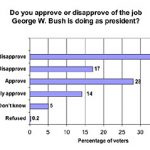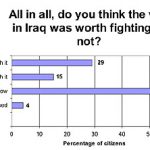The latest Elon University Poll finds President George W. Bush’s overall approval rating at 41 percent among North Carolinians, down from 52 percent in a March 2005 Elon Poll. Fifty-three percent said they disapproved or strongly disapproved of Bush’s performance as president.
 The poll, which surveyed 539 adults Oct. 24-27 and has a margin of error of +/- 4.3 percent, also surveyed citizen opinion on Bush’s handling of the economy and the Iraq war. Thirty-seven percent approved or strongly approved of Bush’s handling of the economy, down from 42 percent in a September 2004 Elon Poll but about the same as 36 percent in April 2005.
The poll, which surveyed 539 adults Oct. 24-27 and has a margin of error of +/- 4.3 percent, also surveyed citizen opinion on Bush’s handling of the economy and the Iraq war. Thirty-seven percent approved or strongly approved of Bush’s handling of the economy, down from 42 percent in a September 2004 Elon Poll but about the same as 36 percent in April 2005.
Thirty-nine percent of respondents approved or strongly approved of Bush’s handling of the war in Iraq, down from 45 percent in a March 2005 Elon Poll. Fifty-seven percent disapproved or strongly disapproved of Bush’s handling of the Iraqi war, up from 43 percent in March 2005.
“Certainly, the Bush administration seems to be in a rut with the public,” said Hunter Bacot, director of the Elon University Poll. “We can say it’s the war or the economy, both of which are almost indisputably playing into his poor evaluations, but we also have to consider the events surrounding Hurricane Katrina, the grand jury investigations and now the failure of the President’s Supreme Court nominee.”
Fifty-one percent of those surveyed said the United States should not be in Iraq, compared with 43 percent who agreed with U.S. involvement. Twenty-nine percent said the Iraqi war was not worth fighting, 15 percent said the war was worth fighting, and 52 percent said they didn’t know.

“It appears that the public is growing more weary of this war as we see that people who are evaluating the war are, increasingly, critical in their assessments,” said Bacot.
The poll also measured Bush’s support among current or former members of the military. Fifty-six percent of those who had a military affiliation disapproved or strongly disapproved of the president’s handling of the war in Iraq, while 41 percent approved or strongly approved. Twenty-nine percent of those with a military affiliation said the war in Iraq is not worth fighting, the same percentage as those with no military affiliation. Nineteen percent of those affiliated with the military said the war was worth fighting, compared with 14 percent among those without a military affiliation.
Military personnel were more likely to say the U.S. should still be in Iraq than the rest of the population. Fifty percent said the U.S. should still be in Iraq, with 41 percent of those with a military affiliation saying the U.S. should not be in Iraq.
“We see that those most involved in the Iraq situation, the military, are not so different from the general public after all and share the same concerns about Iraq,” said Bacot. “Conventional wisdom might suggest that the military would be more supportive of Bush in Iraq, but that simply isn’t the case if you look at the numbers.”
Among citizens who are the parent, sibling or relative of a current member of the military, 53 percent said the U.S. should not be in Iraq, compared with 50 percent among those without a military relative. Forty percent of those with a relative in the military said the U.S should be in Iraq, while 44 percent of those without a military relative said the U.S. should be in Iraq.
The Elon University Poll, which began in September 2000, is operated by the Elon Institute for Politics and Public Affairs. The Elon University Center for Public Opinion houses the Elon University Poll and conducts frequent statewide public opinion surveys on issues of importance to North Carolinians. The survey results are shared with media, citizens, and researchers to facilitate informed public policy making through the better understanding of the opinions and attitudes of North Carolina citizens. By conducting several public opinion surveys annually, the Elon University Poll continually contributes to the advancement of North Carolina and its citizens, which further enhances its status as the poll of record in North Carolina.
Interviews for the Elon Poll are conducted by students who work under the supervision of faculty members in the political science department. A computerized polling center located on campus is equipped with sophisticated statistical software and 38 telephone polling stations.
-30-


